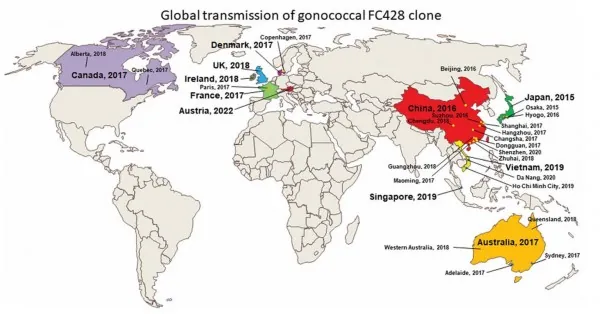
The Alarming Rise of the FC428 Clone: A New Threat in the Fight Against Gonorrhea
2024-12-30
Author: Arjun
Introduction
Neisseria gonorrhoeae, the bacterium responsible for the sexually transmitted infection gonorrhea, is rapidly evolving, making treatment increasingly challenging.
Emergence of FC428 Clone
Historically, ceftriaxone was considered the last effective line of defense against both urogenital and pharyngeal infections. However, the emergence of high-level ceftriaxone-resistant strains linked to the FC428 clone poses a significant threat to this treatment option.
Global Transmission and Treatment Challenges
A recent review published on January 23, 2023, in the journal Infectious Microbes & Diseases highlights the global transmission and escalating treatment challenges posed by ceftriaxone-resistant gonorrhea. Initially identified in Japan in 2015, the FC428 gonococcal clone has since spread to multiple continents, including Asia, Europe, and North America, leading to treatment failures in various regions. The clone's resistance is chiefly attributed to the penA allele 60.001, which allows it to thrive even in the face of ceftriaxone treatment.
Characteristics of the FC428 Clone
What makes the FC428 clone particularly concerning is its ability to maintain minimal impact on the bacterium's overall fitness, allowing it to spread more efficiently.
Current Treatment Strategies and Failures
Reports show that while some cases have been treated with increased doses of ceftriaxone—ranging from 500 mg to 2 g—and sometimes in combination with azithromycin, many have resulted in treatment failures. This situation underscores the urgent need for alternative treatment strategies.
Investigating New Therapies
One promising potential therapy currently under investigation is Ertapenem, which has shown encouraging results in treating ceftriaxone-resistant strains, though further clinical studies are crucial to validate its effectiveness.
Expert Insights
With the FC428 clone's distressing trajectory, Dr. Stijn van der Veen, an esteemed microbiologist at Zhejiang University, warns, 'The rapid spread of the FC428 clone is highly troubling and poses a significant threat to ceftriaxone's effectiveness—the last reliable treatment we have against gonorrhea. The clone’s ability to propagate with minimal fitness costs could lead to an uncontrollable public health crisis.'
Need for Global Surveillance and Research
This situation calls for comprehensive global surveillance and research initiatives aimed at developing new antibiotics or combination therapies that can effectively combat drug-resistant gonorrhea.
Conclusion
The rise of the FC428 clone has exposed vulnerabilities in our current treatment approaches, underscoring a critical need for healthcare systems to brace for a future where ceftriaxone may no longer suffice. The public health community must prioritize continued investment in research and foster international collaboration to avert the potentially widespread consequences of an untreatable sexually transmitted infection.
As resistance rates climb and treatment options dwindle, the time to act is now—before gonorrhea outpaces our capacity to manage it effectively. Stay informed and proactive; together we can confront this growing threat head-on.
 Brasil (PT)
Brasil (PT)
 Canada (EN)
Canada (EN)
 Chile (ES)
Chile (ES)
 Česko (CS)
Česko (CS)
 대한민국 (KO)
대한민국 (KO)
 España (ES)
España (ES)
 France (FR)
France (FR)
 Hong Kong (EN)
Hong Kong (EN)
 Italia (IT)
Italia (IT)
 日本 (JA)
日本 (JA)
 Magyarország (HU)
Magyarország (HU)
 Norge (NO)
Norge (NO)
 Polska (PL)
Polska (PL)
 Schweiz (DE)
Schweiz (DE)
 Singapore (EN)
Singapore (EN)
 Sverige (SV)
Sverige (SV)
 Suomi (FI)
Suomi (FI)
 Türkiye (TR)
Türkiye (TR)
 الإمارات العربية المتحدة (AR)
الإمارات العربية المتحدة (AR)